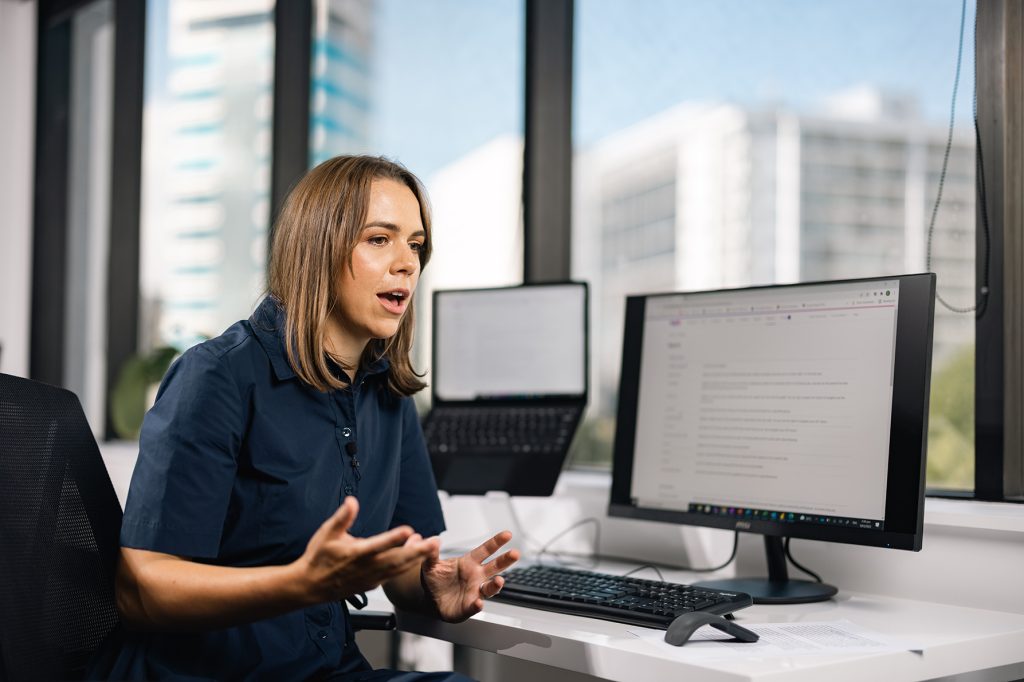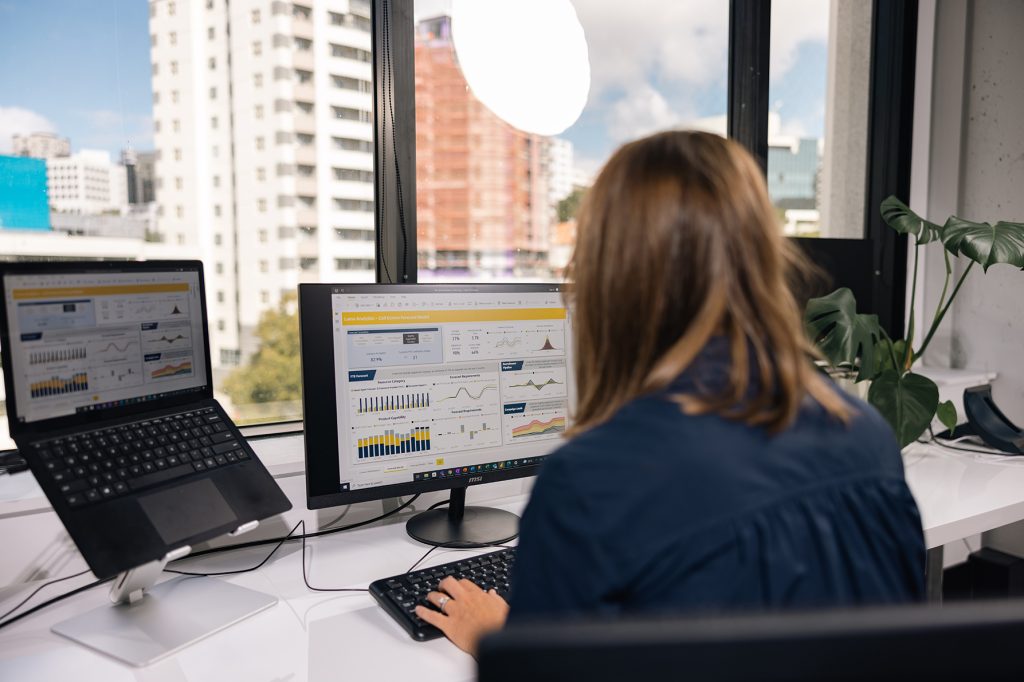Data Driven Success
New Zealand company Luma Analytics is on a mission to “accelerate the world’s understanding of the power of data, and provide the tools to unlock its value.” In just over three and half years, their insights have unlocked potential for some of New Zealand’s largest companies, as well as a range of industries around the world.
Co-founder Emily Shaw analyses her decision to make the jump into business, the difference between ‘good busy’ and ‘bad busy’, as well as the power of letting go.
How did you see an opportunity for what you’re doing now?
I was working in analytics at a bank and enjoyed uncovering the insights and working with data information to tell stories with data. I thought it would be a great opportunity to help other companies unlock the value of their data.
My dad went out on his own at a young age, so I was inspired by his journey. I took the opportunity to start thinking about what it would look like if I went out on my own.
I was lucky that I had my two business partners join me; they have also come from the bank. We’re really excited about helping other companies unlock the value of their data through my six years of working in analytics.
That time has been interesting, as we’ve managed to work over lots of different industries, helping businesses identify and solve challenges with data. It’s really about showcasing what’s possible with data analytics.
Sign Up To MYOB’s Free 30 Day Trial
You’re obviously a very data-driven person. How much analysis of the opportunity did you undertake before launching in?
When I was in the bank, I was on this very traditional leadership trajectory; I had worked my way up and I was at a really good point. My dad gave me a book called When To Jump, which featured stories about other people taking opportunities to go out on their own and how it’s not as scary as you think. I had a business coach at the time and she was saying to me, ‘What’s the worst that can happen? You keep thinking of all these bad things but think about all the positive things that could happen as well’.
I was taking a lot of opinions from others and it was hard to navigate everybody’s ideas about what I should be doing with my life. It just got to the point where I just listened to my gut. If you don’t do it now, you will probably never do it. I remember the day I handed in my resignation and my boss was like, ‘Oh my God’. And everybody was like, ‘Where are you going? What are you doing?’ I just said, ‘I’m just going to take some time out’. That was when I really assessed what I was going to do and how I was going to do it.
Being such a data-driven person, I didn’t look at any stats. It was what felt in my gut to be a really good opportunity, and what has actually transpired is that it’s growing much faster and I’ve achieved much more than I ever thought I was capable of.
It was scary and there was a lot of doubt, but it was all self-doubt. You’ve just got to learn to push past that and back yourself. Not take too many other people’s opinions on board – or, take them on board, but size them down too.
How important was it watching your dad go out and do his own thing, as a foundation for you growing up?
It was really important because he instilled an entrepreneurial spirit in me.
When I had ideas when I was younger, he was really supportive of them. I saw how he was able to manage his lifestyle being a business owner and able to take all of January off to spend time as a family. We could go out on holidays and he was available a lot of the time, plus we could go into work with him. He showed us what it looked like and what was possible.

Could you have imagined that you would be where you are now?
Absolutely not, no way. I never dreamed that. We are up to 16 staff now and we’ve only been in business for three and a half years, two of which have been during a pandemic.
I remember building our website on the first day and we were really excited by our first contract, which was only $20,000. It’s so hard to have ever envisioned that I would be where I am today.
With the experiences that you’ve had in the last three years, do you feel like you’ve reached another level?
Oh, definitely. If I had just stayed in that traditional leadership structure, I’d probably still be in the same role or have done a couple of other different projects. But now I’ve met a whole range of people that I never would’ve met, worked across a range of different industries and gone overseas. It really pushed me.
There are so many unknowns and you come up with situations that you’ve never dealt with before. I’m building websites and doing sales. It’s been such a unique opportunity. I do think I’ve grown much faster than where I would’ve been if I had just stayed in the banking role. It’s definitely broadened my skill set.
Have there been challenges or hurdles that you’ve come across in the last few years that you would not have imagined?
You deal with the operational parts of the business and there have been some challenging times with things that I would have never envisioned happening. When you lose your first client, that can be quite an overwhelming experience. It’s not like you’ve lost them because you did a poor job. They have just moved on.
You’ve just got to pick yourself back up and keep going and remember what your vision and your success have been so far. It has been really important on that journey.
There’s a lot more discussion about transparency, vulnerability and leadership these days. Is there a balance there? How much of that do you pass on to the rest of the office when, for example, you lose a client?
Obviously, we have to communicate to the team that we’ve lost that client. I am a very open, transparent and vulnerable leader, but I do think there’s an element of protecting your team because that protects the culture and you don’t want to scare them into thinking the business is failing. It’s about how you message that to the team.
There’s an element of protection that you provide to the team as a leader but you’ve got to communicate what’s going on in the business as well. We’re a small team and it’s obvious when you do lose a client or they stop subscribing to your services.
Were there day-to-day things that you did not expect to be dealing with or that you had to learn?
It’s so hard to navigate. Setting up the company, even incorporating the company, you have to navigate all this online information and then find an accountant as well. You Google ‘small business accounting’ and you end up with a whole raft of accountants and lawyers checking over our shareholder agreements and our statement of work. And then setting up the banking, what do we even ask for? What do we even need? When we hired our first employee, where do we get an employment contract from?
There are so many things that come up as a business owner and you have to turn to Google. It’s really hard to get all the right tool sets. We spent a lot of time trying to streamline our lives and outsource all of that stuff, because it’s hard for us too.
We are not the experts and we found out quite quickly that Googling ‘KiwiSaver opt-out forms’ in the middle of the night when we have a new employee is not the best use of my time. We have now outsourced our HR function to a company called MyHR. They provide that advice for us and it’s a much better use of my time. We get the right outcome for our employees.
I found that to be the hardest part. Now when I hear about friends that are going out on their own, I will now message them and say, ‘Let me know if you need some advice or some help,’ because it’s very, very difficult to navigate what you should be doing.
Was it a hard thing, psychologically, to let go?
I think it just came to a head where me and my other two business partners were just doing so much admin and it was consuming our lives. It got to the point where we weren’t actually enjoying the business that much. It was bad busy. I just got sick of Googling everything and I felt like I was not doing the right thing. That’s when we made a conscious decision to outsource the HR.
If I wanted my life back, this is how we had to do it. It’s really hard when you own the business because it’s your baby and you don’t want to let any aspect of it go, but you’ve got to trust the experts and trust other people because otherwise you can’t grow.
If that is bad busy, what is good busy for you?
Good busy to me is when you are really energised by what you’re doing. You’re productive, you’re excited to get up in the morning because you know you’ve got a busy day, but there’s exciting things to do. You’re not chasing your tail. You can focus on tasks and focus with the team.
We’ve all been bad busy. You’ve got a thousand things going on in your brain, you feel anxious. You’re rushing around trying to get to the next thing done, emails are popping up. You’re trying to do too many things at once, you make mistakes. There is a good delineation between the two and we want to get back to being good busy.
In lockdown, it was especially hard with everything being online and digital and all these things flying around. Good busy is when you feel productive and positive about what you’re doing.

Would you have any advice for other people about how to cut out what you shouldn’t be doing and focus on what energises you?
Set boundaries. I’m working from home today, but the lockdown was a great example of that. There were no physical boundaries between work and life; they were blurring. I always try to go into the office when I’m working.
Also, setting boundaries around how I will manage my time is a big factor. I tend not to go out on a Monday, Tuesday or Wednesday night. I need that time to get everything in order for work. Then I can taper off during the weekends and spend more time with friends and family.
I’ve also had to make a conscious decision around spending my time with people that are a high priority or people that energise me or make me feel good when I’m with them, a support function. That has been important, setting those boundaries.
Sometimes you don’t know you’re bad busy until you’re out of it. Look back retrospectively and identify the triggers that are going off in yourself that indicate that you’re bad busy.
Schedule time to do things that you enjoy. I love going to the gym and so I always try to go throughout the day. Sometimes I might not be able to go in the morning, but I always make sure I can go at some point during the day. I provide flexibility within my life so that I do feel like I have that balance to get into my flow.
When you took a step back and separated what was good busy and what was bad busy, what difference did that make to productivity?
When I’m bad busy productivity-wise, in my mind I got heaps and heaps of tasks done because I was doing them so fast, but you do make errors and then the stuff ends up coming back to you. You end up reworking it and doing it twice. Sometimes it’s better to spend the time and do it right and do it once.
Good busy is when you produce more work that you’re proud of because you’ve been able to spend time and put more thought into it and put something out that you’re proud of. You can put the time and energy into doing it right and feel like you’ve put the right amount of time and effort into something to do the best of your ability. When you’re bad busy, you don’t have time. You’ve just got to do something very quickly and send it out.
We have so much at our disposal with so much data; emails on our phones that we check when we wake up. Is there a balance between cutting out some of the noise and having some ‘you’ time?
Yes, definitely. That’s something that I have recently put in place for myself; putting the sleep alert on my phone at 9:30pm, so that even if I am scrolling on my phone, I’m not getting emails, I’m not getting notifications. Even if I have my phone sitting by my bed, I don’t see the light go off. For me, that has been very important to stop burnout because sometimes I’ll get an email at 10 o’clock at night and then I would run downstairs and look at it. That’s completely stopped now.
I do think it’s important to get outside, go to the gym, do things where your brain can just relax. You’re not looking at information. You’re not reading emails. You’re not watching TV. Your mind can wonder. It’s important because that’s where your best ideas can come from.
Can you talk about some of those moments where you felt close to burnout?
When lockdown started, there was a lot going on. We had a big engagement and we weren’t falling behind, but there was a lot to get through. It got to the point where I was working 18-hour days and still trying to do the admin tasks.
We had new people starting. We were trying to onboard them. We had to worry about our staff all working from home; a lot of them worked in apartments by themselves which weren’t set up for home offices. I was just really tired. I wasn’t sleeping and didn’t go outside for two weeks, I hardly ate. I never left my office to eat, my husband would bring me my food. I was just go, go, go, go, go.
It got to the point where one day I nearly just cried. The smallest trigger would make me upset. On reflection now, and I’ve spoken about this with my business partners, I didn’t realise that was happening to me. It’s not until you go back and you look at those triggers where you’re so unmotivated to even go outside or take a break to go and have dinner. That was the pivotal point for me and that was when we realised that we needed to outsource some of these tasks that we were running ourselves into the ground to do.
Is it a bit of a hit to the ego to come to the awareness that you can’t do everything and you shouldn’t do everything?
Not for me personally. I think it’s harder for other people to let go, but not for me, because I’m really open with my team. I’m not the most technically smart person on the team. I’m really open with everyone when I don’t know something.
It didn’t really bother me too much. We hire people that are smarter than us so that we can put our trust in them. You’ve just got to let go. That’s been my biggest lesson.
Are there any particular solutions you’ve come across that help reduce your workload, leaving you to focus on the important things?
Having started in banking, we’d become familiar with many different business solutions and one of the platforms that stood out was MYOB. I looked at the total package and I thought, ‘This will do what we want it to do’. I remember we had to send the first invoice and it was really, very easy to use.
We can create our own templates and, as we’ve grown, we’ve been able to grow with MYOB. We’ve been able to add on payroll and financial reporting, which we now use monthly. We’ve started to implement budgeting. We’ve gotten big enough now that we’ve set budgets and we’re about to load those into MYOB.
On a day-to-day basis, we use it as one of our everyday tools. We invoice, we can look at all our transactions, we can see who’s paid us and who hasn’t paid us. It’s great because we can just go in and quickly see what our GST bill might be in a month’s time. It’s in a format that we can just load straight into IRD. It’s been a fantastic tool that has been a big part of the journey.
Were there any unexpected benefits of scaling up using a solution like MYOB?
I don’t know why, but we were tracking financials on a spreadsheet and realised we can actually use MYOB for this. The best thing is that they have an online community where lots of people ask really similar questions. Now that we have our office admin manager, she’ll often read up on things like how to deal with a refund and how to categorise it.
We have been able to outsource a lot of our day-to-day tasks through MYOB, especially financial, which makes the tax process much easier because it just gives you the number that you’ve got to load in and pay. It does all that for you.

What are the common operational ‘pain points’ that you’ve been able to solve with MYOB?
Chasing up on debtors is one. From MYOB, you can just resend the email from there. You don’t have to go in and go, ‘Hey, can you please pay this?’ I find the invoicing part of it super easy because you can load up all your contacts. All our clients are there, and you can just easily duplicate a new invoice based on your last month’s one and it’s easy to send it out.
The tax component piece is also another one. They have a whole lot of reports that you can run. I can just run the GST report. I can run the PAYE report and then I can plot that number straight into IRD.
Payroll is also good because, speaking to other business owners, a lot of people get payroll software. We’ve been able to do it all through MYOB, which has been great because we didn’t need to have two tools. Now we can put our budgets in there and we don’t track anything in a spreadsheet anymore.
We can see how we’re tracking against the budget and have a good conversation between me and the other two business partners on what cash flow looks like and so forth. They have a good dashboard too where we can see what the cash flow’s looking like for the month.
What pain points are you solving for your customers?
We operate across three service lines. The first service line is helping clients move from the traditional data infrastructure; that old and clunky architecture that doesn’t integrate with lots of the other systems. We help them move into more of a modern cloud architecture or what we call a modern cloud data platform. That enables them to integrate all the sources that they’re using, get all their data in one place, and then easily report off it.
We create all those reports using lots of different tools that are available in the market, but we create interactive dashboards so it’s all automated. We work with a lot of other small businesses to automate, bring all their financial information together with their customer information, with their workflow tools, and present it in an easy format that they can use for their team.
On the more advanced side, we do a lot of more advanced analytics. We might help companies forecast the number of staff that they’ll need over the next year based on how many transactions they’ve been doing over the past three years. We calculate if they need an office in this location or a branch in that location.
At a high level, those are the three areas that we cover off, but every industry is totally different and their business problems are different. Some of the things that we solve for them are at a generic high level, even understanding your customer behaviour. What are your customers doing and is that different across different age groups? Do they have different purchasing characteristics? We also help them optimise products; helping them understand what products are selling better than others and why that might be.
We can also do supplier analysis. For large companies, we look at their list of suppliers, we help them identify outliers. Suppliers that have been providing the same services, but at a much higher cost, so then they can start looking at different supplies to use.
There are so many business problems that we help customers with and what’s been good for me is having that impact. You can provide them with that information and they can dramatically improve their business, their products and their services. That’s awesome to get that feedback back to the team, too. It gives you a purpose for what you’re doing
What’s the best advice you’ve ever been given?
I had a business coach before I went out on my own and I used to get quite down at the end of my day, thinking I wasn’t productive or successful. She said to me, ‘Redefine your definition of success because you are pinning success to a tangible outcome. Success can mean lots of different things to lots of different people’.
I started reflecting on that advice and it’s true. You can get to the end of the day and you might not have delivered something, but you may have had a great conversation with your staff member or a client and that should be what success looks like.
That was really helpful from a mental wellbeing perspective. Success looks different to lots of different people. You need to define what your own success looks like. When I set out to start my business, success was setting up the company and incorporating it. Your definition of success changes over time.
What do you think your definition of success will be in another three and a half years?
I hope my company has still got the great culture that it has today. We’ve tripled in size and we’re still helping our clients. I’m still loving it and enjoying it; that would be success to me.

